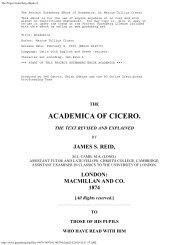From Farm House to the White House - 912 Freedom Library
From Farm House to the White House - 912 Freedom Library
From Farm House to the White House - 912 Freedom Library
You also want an ePaper? Increase the reach of your titles
YUMPU automatically turns print PDFs into web optimized ePapers that Google loves.
<strong>Farm</strong> <strong>House</strong> <strong>to</strong> <strong>the</strong> <strong>White</strong> <strong>House</strong>, by William M. Thayer 134<br />
brave and fearless patriots, <strong>the</strong>y resisted. Tea was universally discarded. Ship-loads of it in Bos<strong>to</strong>n, New<br />
York, and o<strong>the</strong>r ports were returned <strong>to</strong> England, or packed away <strong>to</strong> perish. In Bos<strong>to</strong>n seventeen citizens<br />
disguised <strong>the</strong>mselves as Indians, boarded an English tea-vessel, and cast <strong>the</strong> tea in<strong>to</strong> <strong>the</strong> dock. This act<br />
aroused <strong>the</strong> British lion, and he shook his mane and roared. Soon an English fleet appeared in Bos<strong>to</strong>n Harbor<br />
<strong>to</strong> reduce <strong>the</strong> inhabitants <strong>to</strong> subjection by force of arms. At <strong>the</strong> same time, <strong>the</strong> Bos<strong>to</strong>n Port Bill was enforced,<br />
<strong>the</strong>reby closing <strong>the</strong> harbor of that city <strong>to</strong> commerce.<br />
The citizens refused <strong>to</strong> provide quarters for <strong>the</strong> English troops, and declared, in public assembly, that<br />
quartering British soldiers in <strong>the</strong> State <strong>House</strong> and Faneuil Hall, as <strong>the</strong> English officers had done, was a still<br />
fur<strong>the</strong>r and graver invasion of <strong>the</strong>ir rights.<br />
We should have said that <strong>the</strong> day on which <strong>the</strong> Stamp Act went in<strong>to</strong> operation, Nov. 1, 1765, was observed<br />
throughout <strong>the</strong> Colonies as a day of fasting and prayer. The day was ushered in by <strong>the</strong> <strong>to</strong>lling of bells, as if <strong>the</strong><br />
funeral ceremonies of <strong>the</strong> king himself were <strong>to</strong> be performed. Ships displayed <strong>the</strong>ir colors at half-mast.<br />
Business was suspended, and halls and churches were opened for prayer and addresses. Washing<strong>to</strong>n's journal<br />
shows that he spent <strong>the</strong> day very much as he did his Sabbaths, in devout worship in <strong>the</strong> house of God, and<br />
religious exercises at home.<br />
In Bos<strong>to</strong>n a solemn procession bore along <strong>the</strong> streets effigies of <strong>the</strong> men who were promoters of <strong>the</strong> Act,<br />
burying <strong>the</strong>m with appropriate ceremonies. In New York City a similar procession carried <strong>the</strong> printed Act<br />
itself upon a pole, surmounted by a death's head, with a scroll bearing <strong>the</strong> inscription,<br />
"THE FOLLY OF ENGLAND AND RUIN OF AMERICA."<br />
Lieutenant-Governor Colden, who had lent his influence <strong>to</strong> secure <strong>the</strong> Act, fearing violence, fled <strong>to</strong> <strong>the</strong> fort,<br />
and garrisoned it with marines from a ship of war. "The mob broke in<strong>to</strong> his stable, drew out his chariot, put<br />
his effigy in<strong>to</strong> it, paraded it through <strong>the</strong> streets <strong>to</strong> <strong>the</strong> Common (now <strong>the</strong> Park), where <strong>the</strong>y hung it on a<br />
gallows. In <strong>the</strong> evening it was taken down, put again in<strong>to</strong> <strong>the</strong> chariot, with <strong>the</strong> devil for a companion, and<br />
escorted back by <strong>to</strong>rchlight <strong>to</strong> <strong>the</strong> bowling green, where <strong>the</strong> whole pageant, chariot and all, was burnt under<br />
<strong>the</strong> very guns of <strong>the</strong> fort."<br />
The day on which <strong>the</strong> Bos<strong>to</strong>n Port Bill went in<strong>to</strong> effect was also set apart as a day of fasting, and similar<br />
demonstrations were made throughout <strong>the</strong> Colonies.<br />
It is necessary <strong>to</strong> turn aside at this point <strong>to</strong> speak of Washing<strong>to</strong>n's visit <strong>to</strong> Ohio in <strong>the</strong> interest of his officers<br />
and soldiers. It will be remembered that <strong>the</strong> Governor of Virginia pledged <strong>the</strong> Virginia troops led by<br />
Washing<strong>to</strong>n <strong>to</strong> <strong>the</strong> Ohio, two hundred thousand acres of <strong>the</strong> best land in that region. Years passed by, and this<br />
pledge was not redeemed. The British ministry opposed redeeming <strong>the</strong> pledge. But Washing<strong>to</strong>n did not forget<br />
<strong>the</strong> claim of his old associates in <strong>the</strong> hardships and perils of war. He <strong>to</strong>ok <strong>the</strong> matter in hand, and seized upon<br />
an opportune moment <strong>to</strong> carry out his purpose. He even performed a journey <strong>to</strong> <strong>the</strong> Ohio <strong>to</strong> select <strong>the</strong> best<br />
land possible for his deserving comrades. The opportune moment he chose for his journey is described as<br />
follows by Irving:<br />
"The Six Nations, by a treaty in 1768, had ceded <strong>to</strong> <strong>the</strong> British Crown, in consideration of a sum of money, all<br />
<strong>the</strong> lands possessed by <strong>the</strong>m south of <strong>the</strong> Ohio. Land offices would soon be opened for <strong>the</strong> sale of <strong>the</strong>m.<br />
Squatters and specula<strong>to</strong>rs were already preparing <strong>to</strong> swarm in, set up <strong>the</strong>ir marks on <strong>the</strong> choicest spots, and<br />
establish what were called preemption rights. Washing<strong>to</strong>n determined at once <strong>to</strong> visit <strong>the</strong> lands thus ceded,<br />
affix his mark on such tracts as he should select, and apply for a grant from government, in behalf of <strong>the</strong><br />
'soldiers' claim.'"<br />
This expedition was attended by considerable danger, as <strong>the</strong> Delawares, Shawnees, and Mingees considered<br />
that <strong>the</strong>ir rights were invaded by <strong>the</strong> action of <strong>the</strong> Six Nations. The appearance of white men upon <strong>the</strong>ir















